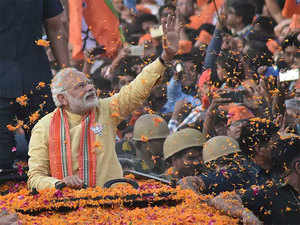
This should cheer the markets and foreign investors wary of any disruptive change in policies in any market in which they invest. However, these are not a reliable predictor of the actual numbers that would be announced on the 23rd, just hours from now.
Exit polls do not have a reliable track record of forecasting electoral outcomes. In the 2004 and 2009 elections, the average of all tallies of exit polls greatly exaggerated the BJP-led National Democratic Alliance’s results, and in 2014, underestimated its tally.
Exit polls tend to go with the popular perception of the popular perception, rather than measuring the popular perception itself. In 2004, the general expectation was that, since India was shining, the incumbent NDA government would be voted back to power. The average of exit polls gave the NDA 252 seats, whereas it actually got 187. In 2009, no strong current was visible and exit polls put the NDA at 187 and the UPA at 196, but the actual results were 159 and 262 respectively.
Lok Sabha Elections#Elections With 
- All
- Uttar Pradesh
- Maharashtra
- Tamil Nadu
- West Bengal
- Bihar
- Karnataka
- Andhra Pradesh
- Telangana
- Kerala
- Madhya Pradesh
- Rajasthan
- Delhi
- Other States
In 2014, the general expectation was that the UPA would be voted out and the exit polls gave the NDA 274, whereas the actual outcome was an upsurge of support for the promised Achche Din (good times) of the Modi Sarkar, netting it 336 seats, and the BJP alone 282. In 2019, the general perception has been that the NDA would return to office, but with a reduced majority, and the exit polls validate that perception.
Exit polls get things dramatically wrong around the world. The latest example is the Australian elections. Exit polls got Brexit wrong. Ditto in the US presidential elections that followed, with practically all polls favouring Clinton.
Exit polls make for good television. Everywhere. But in India, there are reasons to rely on exit polls even less than in other countries. India is an extremely hierarchical society, with very unequal distribution of social and political power.
This means that in most parts of India, few would risk expressing their frank opinions to a random pollster. People are conditioned to tell the questioner what they expect the questioner wants to hear.
The lesson from past exit polls is to not bet your bottom rupee on their veracity. Provide for a largish margin of error. An outlier in these polls shows the BJP dropping 51 seats in UP, for example, from its tally of 73 in 2014 along with an ally. The chances are this gets it entirely wrong, of course. But what if it does not? For everyone except the professional gambler, safe is better than sorry. And that means a little patience to wait for the official tally.
Download The Economic Times News App to get Daily Market Updates & Live Business News.
Subscribe to The Economic Times Prime and read the ET ePaper online.
Download The Economic Times News App to get Daily Market Updates & Live Business News.
Subscribe to The Economic Times Prime and read the ET ePaper online.













 Get Unlimited Access to The Economic Times
Get Unlimited Access to The Economic Times
